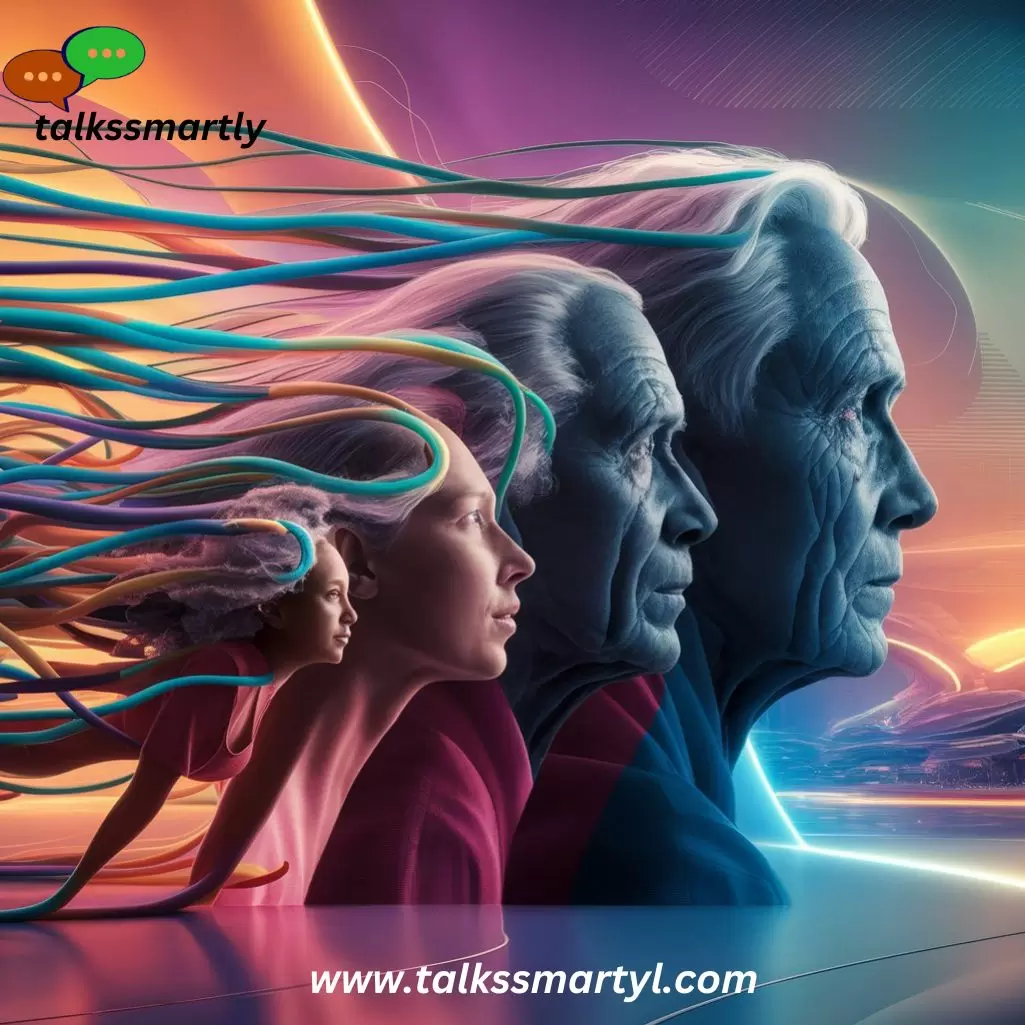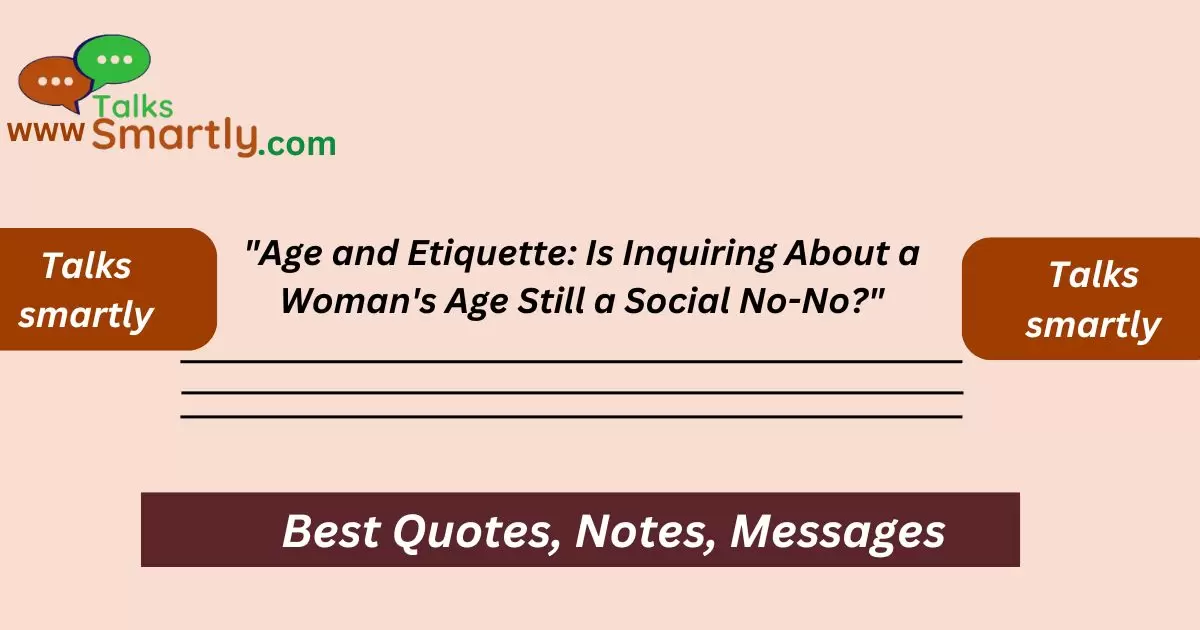Inquiring about a woman’s age remains a delicate topic, often considered impolite due to societal norms surrounding privacy and respect. However, context and individual relationships can influence whether such inquiries are perceived as appropriate or not.
Asking a woman her age has long been considered a taboo question. This cultural norm has persisted for decades, making people hesitant to broach the subject. In 2024, the question remains awkward and controversial, sparking debates about gender norms, privacy, and societal expectations.
This article explores the historical stigma, double standards, fear factor, and modern perspectives surrounding the age question. We will also provide practical tips for navigating this sensitive topic in a respectful and open manner.
The Historical Stigma

The historical stigma surrounding a woman’s age stems from societal expectations and gender norms. For centuries, women were often judged based on their youth and appearance, leading to an ingrained discomfort with revealing their age.
- Cultural Norms: Historically, society placed immense value on a woman’s youth, linking it to beauty and fertility. This cultural emphasis created pressure for women to maintain a youthful appearance and avoid discussing their age.
- Media Influence: The portrayal of women in media has reinforced the stigma. Advertisements, films, and magazines often glorify young women, subtly implying that aging diminishes a woman’s worth.
- Social Judgments: Women who reveal their age may face judgments and stereotypes. Older women are often seen as less attractive or less capable, contributing to the reluctance to disclose their age.
Suggestion: “I think it’s ridiculous that asking a woman’s age is still considered taboo. We should be able to have open and honest conversations without judgment.”
The Double Standard
The double standard in age-related questions highlights the differing societal expectations for men and women. Men are often perceived positively as they age, while women face scrutiny and judgment.
- Aging Gracefully: Men are frequently praised for “aging gracefully” and are often seen as distinguished or wise as they grow older. In contrast, women are pressured to maintain a youthful appearance.
- Career Impacts: In professional settings, older men are often viewed as experienced and valuable, while older women may face ageism and discrimination. This double standard can affect women’s career progression and self-esteem.
- Relationship Dynamics: In romantic relationships, older men dating younger women is often normalized, while older women dating younger men can be met with skepticism or criticism.
Suggestion: “It’s unfair that men and women are judged differently based on age. We should challenge these double standards and promote equality.”
The Fear Factor
The fear factor associated with asking a woman’s age often stems from the potential for negative reactions and the societal pressure to remain youthful.
- Fear of Offense: Many people avoid asking a woman’s age out of fear of offending her. The question can be perceived as intrusive or disrespectful, leading to awkwardness and discomfort.
- Ageism Concerns: Women may fear revealing their age due to potential ageism. In both personal and professional settings, disclosing one’s age can lead to unfair treatment or bias.
- Self-Perception: Women may also internalize societal expectations, feeling insecure or inadequate about their age. This fear of judgment can discourage open discussions about age.
Suggestion: “We need to create a culture where women feel comfortable sharing their age without fear of judgment or discrimination.”
The Elephant in the Room
Despite progress in gender equality, the age question remains a proverbial “elephant in the room.” Addressing this issue requires acknowledging its existence and working towards more open and respectful conversations.
- Breaking the Silence: To move past the stigma, we must openly discuss the discomfort surrounding age questions. Acknowledging the issue is the first step towards change.
- Encouraging Respect: Promoting respect and understanding in conversations about age is crucial. This involves listening, empathizing, and refraining from making assumptions based on age.
- Fostering Inclusivity: Creating inclusive environments where age is not a defining factor can help reduce the stigma. This applies to workplaces, social circles, and media representations.
Suggestion: “Let’s start addressing the elephant in the room by encouraging open and respectful conversations about age.”
The Reframing Revolution
The reframing revolution involves changing the narrative around age and embracing aging as a natural and positive part of life. This shift can help diminish the stigma and promote healthier attitudes towards aging.
- Celebrating Aging: Emphasizing the positive aspects of aging, such as wisdom and experience, can help reframe the conversation. Celebrating milestones and achievements at any age fosters a more inclusive perspective.
- Role Models: Highlighting diverse role models who embrace their age can inspire others to do the same. Seeing influential women proudly discussing their age can challenge societal norms and encourage acceptance.
- Education and Awareness: Raising awareness about ageism and its impact can drive societal change. Educating people about the harmful effects of age-related discrimination can promote empathy and understanding.
Suggestion: “We need to reframe the way we think about aging and celebrate the positive aspects of growing older.”
The Role of Social Media
Social media has significantly impacted how we view age and aging. The platforms often emphasize youth, influencing societal norms and individual self-perception.
- Youth-Centric Culture: Social media platforms often glorify youth, creating pressure to appear younger and perpetuating age-related stigmas.
- Influencers and Role Models: Influencers who embrace their age and promote positive aging can help shift societal attitudes and encourage acceptance.
- Digital Filters: The use of digital filters and photo editing tools on social media can contribute to unrealistic beauty standards and age-related insecurities.
Suggestion: “We should support influencers who promote positive aging and challenge unrealistic beauty standards on social media.”
The Impact of Celebrity Culture
Celebrity culture plays a significant role in shaping societal attitudes towards age. How celebrities handle aging can influence public perceptions and personal insecurities.
- Celebrity Transparency: Celebrities who openly discuss their age and aging process can inspire others to embrace their own age with confidence.
- Age-Defying Standards: The pressure on celebrities to look youthful can perpetuate unrealistic beauty standards, affecting how society views aging.
- Positive Role Models: Celebrating celebrities who age gracefully and break age-related stereotypes can promote a more accepting view of aging.
Suggestion: “Let’s celebrate celebrities who embrace their age and challenge age-related stereotypes, setting a positive example for society.”
The Workplace Perspective
Age can significantly impact professional experiences and opportunities. Addressing age-related biases in the workplace is essential for creating an inclusive environment.
- Ageism in Hiring: Older women may face ageism in hiring processes, limiting their career opportunities. Promoting age diversity can help combat this issue.
- Professional Development: Encouraging continuous professional development and lifelong learning can empower women of all ages to thrive in their careers.
- Mentorship Programs: Implementing mentorship programs that pair younger employees with experienced professionals can foster mutual learning and respect.
Suggestion: “We need to address ageism in the workplace and promote age diversity for a more inclusive professional environment.”
The Personal Identity Aspect
A person’s age can be closely tied to their sense of identity. Understanding this connection can help navigate age-related conversations with empathy and respect.
- Self-Perception: How a woman perceives her age can influence her confidence and self-esteem. Respecting her perspective is crucial in discussions about age.
- Life Stages: Recognizing that different life stages come with unique challenges and achievements can help foster a more understanding dialogue about age.
- Cultural Differences: Age-related attitudes vary across cultures. Being aware of these differences can aid in respectful and inclusive conversations.
Suggestion: “Let’s respect each individual’s unique perspective on age and understand the different life stages they experience.”
The Intersectionality of Age
Age intersects with other aspects of identity, such as race, gender, and socioeconomic status. Considering these intersections is essential for a comprehensive understanding.
- Multiple Identities: A woman’s experience with age can be influenced by her other identities, creating unique challenges and perspectives.
- Intersectional Ageism: Addressing intersectional ageism involves recognizing how age-related biases intersect with other forms of discrimination.
- Inclusive Conversations: Promoting inclusive conversations that consider multiple identities can help create a more empathetic and understanding society.
Suggestion: “We should acknowledge the intersectionality of age and other identities to foster more inclusive and empathetic conversations.”
The Future of Age Perception

Looking ahead, it’s important to consider how societal attitudes towards age might evolve and what steps we can take to promote positive change.
- Changing Norms: As societal norms continue to evolve, there’s potential for a more accepting and inclusive view of age in the future.
- Advocacy and Awareness: Advocacy efforts and raising awareness about age-related issues can drive meaningful change in societal attitudes.
- Empowering the Next Generation: Encouraging younger generations to challenge age-related stereotypes and promote inclusivity can pave the way for a more accepting society.
Suggestion: “Let’s advocate for positive change in how we perceive age and empower the next generation to challenge stereotypes.”
Tips for Navigating the Age Question
Navigating the age question requires sensitivity and awareness. Here are some practical tips for approaching this topic respectfully and thoughtfully:
- Ask with Respect: When asking about someone’s age, do so with respect and genuine interest. Avoid making assumptions or judgments based on their response.
- Gauge Comfort Levels: Before asking a woman her age, consider her comfort level with the topic. If she seems hesitant, it may be best to avoid the question altogether.
- Focus on the Individual: Rather than focusing on age, shift the conversation to the individual’s experiences, achievements, and interests. This approach can foster deeper and more meaningful interactions.
Suggestion: “It’s important to approach the age question with respect and sensitivity. Focus on the person’s experiences and interests instead of their age.”
Conclusion
In 2024, the question of asking a woman her age remains complex and nuanced. The historical stigma, double standards, and societal pressures continue to influence perceptions and interactions. However, by acknowledging these challenges and promoting respectful conversations, we can move towards a more inclusive and accepting society.
Embracing the reframing revolution and adopting practical tips for navigating the age question can help diminish the stigma and encourage open and honest dialogue. Ultimately, it is through empathy, respect, and understanding that we can create a culture where age is celebrated rather than feared.











